CSES Blog
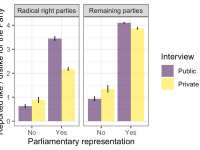
Parliamentary Representation and the Normalization of Radical Right Support
The 2022 GESIS Klingemann Prize for the Best CSES Scholarship was awarded to Vicente Valentim for his article “Parliamentary Representation and the Normalization of Radical Right Support” in Comparative Political Studies. We are grateful that he has provided the following written summary and video presentation about his award-winning research. Parliamentary Representation and the Normalization of Radical Right Support by Vicente Valentim Democracy is more than just a set of legal rules. Well working democracies should also promote a culture of tolerance and inclusion of diverse social groups. Such tolerance and inclusion, however, cannot fully rest on legal enforcement, as it should exist in realms …
Read More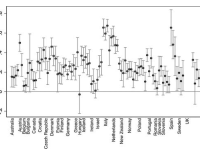
Does the opportunity of policy change shape electoral behavior?
An honorable mention for the 2022 GESIS Klingemann Prize for the Best CSES Scholarship was awarded to Carolina Plescia of the University of Vienna and Francesco Zucchini of the University of Milan for their article “Government alternation and proximity voting: How policy change opportunities shape electoral behavior” published in West European Politics. We thank them for providing the following written summary about their award-winning research. Does the opportunity of policy change shape electoral behavior? by Carolina Plescia and Francesco Zucchini Existing studies on electoral behaviour attests to the importance of ideology when people vote: voters tend to vote for parties they feel …
Read More
Affective Polarization and the Salience of Elections
The 2021 GESIS Klingemann Prize for the Best CSES Scholarship was awarded to Enrique Hernández, Eva Anduiza, and Guillem Rico of the Universitat Autònoma de Barcelona, for their article “Affective polarization and the salience of elections” in Electoral Studies. We are grateful that they have provided the following summary of their award-winning research. Rising anger and hatred in democratic politics have recently attracted considerable attention. Especially during elections campaigns, when loathing opposing parties has become commonplace. This has led to a growing concern about affective polarization, or the predisposition to view opposing parties negatively and co-partisans positively. These feelings of animosity towards opposing parties …
Read More
A (wo)man’s party: understanding ‘gender gaps’ in vote choice
The 2020 GESIS Klingemann Prize for the Best CSES Scholarship was awarded to Eelco Harteveld of the University of Amsterdam, Stefan Dahlberg of the University of Gothenburg, Andrej Kokkonen of Aarhus University, and Wouter Van Der Brug of the University of Amsterdam, for their article “Gender Differences in Vote Choice: Social Cues and Social Harmony as Heuristics” in the British Journal of Political Science. We are grateful that they have provided the following summary of their award-winning research. Image by Mohamed Hassan from Pixabay With a couple of weeks to go until the election, the polls show that Donald Trump is lagging further behind in the race …
Read More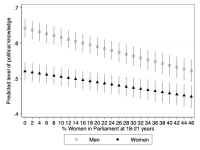
Gender, Political Knowledge, and Descriptive Representation: The Impact of Long-Term Socialization
The 2019 GESIS Klingemann Prize for the Best CSES Scholarship was awarded to Ruth Dassonneville of the University of Montreal and Ian McAllister of the Australian National University for their article “Gender, Political Knowledge, and Descriptive Representation: The Impact of Long-Term Socialization” in the American Journal of Political Science. The authors received their prize and presented their work during a reception at the 2019 Annual Meeting of the American Political Science Association (APSA) in Washington DC, United States. We are grateful that they have provided the following summary of their award-winning research. By Ruth Dassonneville and Ian McAllister Political knowledge …
Read More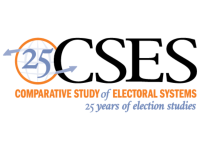
CSES at APSA 2019: Celebrating 25 Years of the CSES
The 2019 annual meeting of the American Political Science Association (APSA) will take place in Washington DC during August 29 – September 1, 2019. To help in planning for those who will be in attendance, we have compiled two lists below. Please be sure to confirm times and locations in the APSA program in case of last-minute changes. The first list includes Saturday night’s CSES 25th Anniversary Roundtable and Reception (which includes a presentation of the 2019 GESIS Klingemann Prize for the Best CSES Scholarship). It also includes two special panels organized by the project, on Thursday …
Read More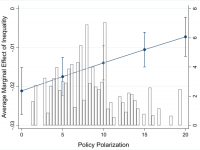
Inequality, Policy Polarization, and the Income Gap in Turnout
by Matt Polacko Previous research into the relationship between income inequality and voter turnout has produced mixed results, as scholarly attention has been fixated on the demands of citizens. Therefore, I build on the previous literature by introducing supply-side logic into the equation, by undertaking the first direct individual-level test of the impact that income inequality (moderated by party positions) has on both turnout and the income gap in turnout. The results of which were presented at the 2019 annual conference of the Midwest Political Science Association (MPSA) in Chicago, April 4-7, 2019. The paper builds on my recent co-authored aggregate-level research, …
Read More
CSES at MPSA 2019
The 2019 annual conference of the Midwest Political Science Association (MPSA) will take place in Chicago, April 4-7, 2019. If you’re planning to attend, you may be interested in the sessions listed below, which make use of CSES data. If you are making a presentation that makes use of CSES data and it does not appear here, please let us know via email: [email protected]. The conference will be held at the Palmer House Hilton. When you arrive at MPSA, please verify the below room locations in the final conference program, as they are subject to change. Friday, April 5, 2019 Panel: …
Read More
New CSES Country Spotlight: Hungary
After a 16 year hiatus, Hungary is back as part of the Comparative Study of Electoral Systems (CSES)! Despite the active participation of the early Hungarian collaborators in the first two modules, Hungary was unable to participate in the third and the fourth modules. In 2018, Central European University and the Friedrich-Ebert-Stiftung, Budapest, Hungary, stepped in to provide the means for a new national survey.The early 21st century, in Hungary, but also in Europe and globally, has been marked by a somewhat unexpected rise in populist politics. In fact, Hungary has often been considered a front-runner in experimenting with populist and …
Read More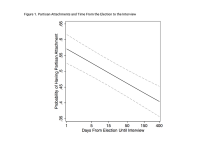
Elections Activate Partisanship Across Countries
Elections Activate Partisanship Across Countries Shane P. Singh Judd R. Thornton It has long been argued that elections make underlying partisan predispositions more prominent. However, existing observational research on this topic is limited by the lack of an exogenous measure of election salience. To overcome this, in our recent article in the American Political Science Review, we leverage the fact that the dates on which Comparative Studies in Electoral Systems (CSES) respondents are interviewed within each post-election survey are likely unrelated to partisanship and its correlates, and we use the number of days between the day of the election and the date …
Read More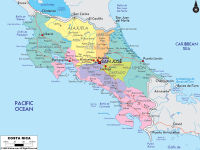
New CSES Country Spotlight: Costa Rica
In the New CSES Country Spotlight series, collaborators from an election study including CSES for the first time discuss its electoral context and the significance of running CSES in the country. New CSES Country Spotlight: Costa Rica Ronald Alfaro-Redondo Costa Rica will join the Comparative Study of Electoral Systems (CSES) collaborative program of research in the near future. Costa Rica is a singular case. We are talking about the oldest and most stable democracy in Latin America. Here, contests are free and fair, electoral rules and institutions are strong and truthful. The Electoral Supreme Court ranks in the top of …
Read More
Linking Party Preferences and the Composition of Government: A New Standard for Evaluating the Performance of Electoral Democracy
The 2018 GESIS Klingemann Prize for the Best CSES Scholarship was awarded to André Blais of the Université de Montréal, Eric Guntermann of the Université de Montréal and University of California Berkeley, and Marc André Bodet of the Université Laval for their article “Linking Party Preferences and the Composition of Government: A New Standard for Evaluating the Performance of Electoral Democracy” that was published in Political Science Research and Methods in 2017. The authors received their prize and presented their work during a reception at the 2018 Annual Meeting of the American Political Science Association (APSA) in Boston, United States. We are grateful that they …
Read MoreCSES at APSA 2018
The 2018 annual meeting of the American Political Science Association (APSA) will take place in Boston, August 31 – September 3, 2018. If you’re planning to attend, you may be interested in one or more of the sessions listed below, which make use of CSES data. This year’s conference theme is: Democracy and Its Discontents. If you are making a presentation which makes use of CSES data and it does not appear here, please let us know via email to: [email protected]. When you arrive at APSA, please verify the below room locations in the final conference program, as they are subject to change. …
Read MoreEconomic Inequality Drives Electoral Winners and Losers’ Satisfaction with Democracy
Economic Inequality Drives Electoral Winners and Losers’ Satisfaction with Democracy Sung Min Han and Eric C.C. Chang Few would dispute that citizens’ support for democracy is crucial for democratic stability and consolidation, especially when populism and extremism threaten to undermine democratic ideals and values in these days. Without citizens’ strong endorsement, democracies can face legitimacy crises and may even experience democratic reversal or breakdown. What factors can influence citizens’ attitudes toward democracy, then? Anderson and his co-authors have significantly advanced our understanding of citizens’ attitudes when they identified electoral winner-loser status to be one of most important determinants for democratic …
Read MoreDo Bad Economic Conditions Explain the Success of Radical Left Parties in Europe?
Do Bad Economic Conditions Explain the Success of Radical Left Parties in Europe? Raul Gómez and Luis Ramiro While most of the literature on economic voting focuses on mainstream parties, and particularly on the incumbent party, little is known about how support for non-mainstream parties is affected by bad economic conditions. The literature on radical-right and Green parties is inconclusive, as unemployment has been found to have positive, negative or no significant effects depending on the study (Mudde 2007: 205-206; Müller-Rommel 1998). It has been often argued that these parties do not fare particularly well in contexts in which the …
Read MoreThe Bipolar Voter: On the Effects of Actual and Perceived Party Polarization on Voter Turnout in Multiparty Democracies
The Bipolar Voter: On the Effects of Actual and Perceived Party Polarization on Voter Turnout in Multiparty Democracies Mert Moral Although it has long been argued that both diversity and distinctiveness of party policy offerings influence electoral behavior, few studies to date have investigated the effect of political polarization on voter turnout. While comparative research on the topic is limited to a handful of studies employing aggregate-level data, previous individual-level studies focus only on the two-party system in the US. On the one hand, some individual-level studies expect high party polarization to provide citizens with clearer cues about party positions …
Read MoreHow Does Partisanship Irrationalize the Decision to Vote in Western and Postcommunist Democracies?
How Does Partisanship Irrationalize the Decision to Vote in Western and Postcommunist Democracies? Dong-Joon Jung The rational choice model of voting assumes that people decide whether to vote as a consequence of the calculation of the benefits and costs associated with voting (Downs 1957; Riker and Ordeshook 1968). According to the model, only those who expect the benefits they will receive to exceed the costs they have to pay would turn out to vote. Often, however, the assumption of rationality betrays the reality; people still vote even though they are clearly aware that the benefits will not be greater than …
Read MoreModes of Data Collection in the 2017 Norwegian National Election Study
Postcard from the Field Modes of Data Collection in the 2017 Norwegian National Election Study Bernt Aardal and Johannes Bergh In our Postcards from the Field series CSES collaborators provide an update and commentary on election studies recently in the field. The first Norwegian National Election Study (NNES) was conducted by Stein Rokkan and Henry Valen in connection with the 1957 parliamentary election. There was no election study in the following 1961 election. The next time around in 1965, and in every Norwegian parliamentary election since then, election studies have been carried out. As a result, the NNES is one …
Read MoreDirectional and Proximity Models of Party Preferences in a Cross-national Context
Directional and Proximity Models of Party Preferences in a Cross-national Context Bojan Todosijević Normative theory suggests that choosing an ideologically close political party is a sign of rational political behavior. Reality, however, sometimes differs from the norm, and voters chose ideologically distant parties. The results of an examination into the macro-level factors that affect the extent to which citizens base their party preferences on ideological proximity were presented at the 7th Annual Conference of the European Political Science Association (Milan, June 22 – 24, 2017). There are two main models that formalize the spatial connection between parties and citizens: the proximity …
Read MoreCSES at ECPR 2017
Are you attending the 2017 general conference of the European Consortium for Political Research (ECPR) in Oslo during September 6 – 9? If so, you may be interested to attend one or more of the below presentations, panels and poster sessions which make use of CSES data. If you are making a presentation which makes use of CSES data and it does not appear here, please let us know via email to: [email protected] THURSDAY SEPTEMBER 7, 2017 Panel: Measuring Rising Forms of Political Participation Thursday September 7, 11:00 am, Building BL27 Georg Sverdrups hus Room: GS 2531 Presentation: Mapping Online …
Read MoreCSES at APSA 2017
Are you attending the 2017 annual meeting of the American Political Science Association (APSA) in San Francisco during August 31 – September 3? If so, you may be interested to attend one or more of the below presentations, panels and poster sessions which make use of CSES data. This year’s conference theme is: The Quest for Legitimacy: Actors, Audiences and Aspirations If you are making a presentation which makes use of CSES data and it does not appear here, please let us know via email to: [email protected] FRIDAY SEPTEMBER 1, 2017 Panel: Media Diversity and Media Freedom Friday September 1, …
Read MoreCoping with Complexity: How Voters Adapt to Unstable Parties
The 2017 GESIS Klingemann Prize for the Best Scholarship using CSES data was awarded to Dani Marinova of the Autonomous University of Barcelona for her book “Coping with Complexity: How Voters Adapt to Unstable Parties” that was published by ECPR Press in 2016. The author received the prize and presented her work during a reception at the 7th Annual General Conference of the European Political Science Association (EPSA) in Milan, Italy. She kindly contributed the following synopsis of her work. Coping with Complexity: How Voters Adapt to Unstable Parties Dani Marinova Nearly five decades ago Carl Friedrich remarked: “Party development is more highly dynamic than any other …
Read MoreExplaining the Trump Victory: Populist Sentiments and the 2016 U.S. Presidential Election
Explaining the Trump Victory: Populist Sentiments and the 2016 U.S. Presidential Election Deirdre Tinney and Stephen Quinlan As the world peers into the crystal ball era of Brexit and President Trump, it has become clear that we need to talk about populism. These days, parties and politicians articulating what are regarded as populist views are to be found in established democracies globally. A vexing question however is do so-called populist sentiments shape vote choice? The Comparative Study of Electoral Systems (CSES) has responded with Module 5, which examines ‘citizens’ attitudes towards political elites, majority rule and out-groups in representative democracy’ …
Read MoreNew CSES Country Spotlight: Argentina
In the New CSES Country Spotlight series, collaborators from an election study including CSES for the first time discuss its electoral context and the significance of running CSES in the country. New CSES Country Spotlight: Argentina Noam Lupu, Virginia Oliveros and Luis Schiumerini Most of what we know about voting behavior is informed by the experience of advanced democracies. The electoral context in developing democracies, however, is significantly different. Civil society is often weak, poverty and inequality high, political parties ephemeral and attachments to them weak, corruption rampant, and clientelism widespread. We cannot hope to understand how politics in these …
Read MoreGetting to Know Masahiro Yamada from the Japanese Election Study
In our Collaborator Introduction series, CSES collaborators discuss their research agenda and how they became involved with CSES. The Japanese Election Study Masahiro Yamada My first involvement with The Comparative Study of Electoral Studies (CSES) began in 2006. Ken’ichi Ikeda, who served on the planning committee for CSES Modules 3 and 4, invited me to join his team for CSES data collection for the Japanese Election Study, and I accepted with great pleasure. His team had collected data for these modules in Japan with support from the Japan Society for the Promotion of Science. After the expiration of …
Read More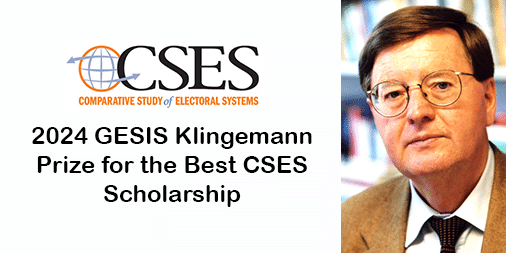
CSES Announcement: Nominations are now being accepted for the 2024 GESIS Klingemann Prize for the Best CSES Scholarship
Note: The following announcement was sent to the CSES email list. To receive notices like this one by email, please join our mailing list. March 25, 2024 The Comparative Study of Electoral Systems (CSES) and the GESIS – Leibniz Institute for the Social Sciences are...

CSES Announcement: Updated Integrated Module Dataset (IMD) now available
Note: The following announcement was sent to the CSES email list. To receive notices like this one by email, please join our mailing list. February 27, 2024 Dear CSES User Community, The Comparative Study of Electoral Systems (CSES) project is delighted to announce...

CSES Announcement: Second Call for Ideas for Module 7 Content
Note: The following announcement was sent to the CSES email list. To receive notices like this one by email, please join our mailing list. February 26, 2024 Dear Comparative Study of Electoral Systems (CSES) User Community,, Now is the time to begin our work on...

CSES Announcement: CSES Module 5 Full Release is now available for download
Note: The following announcement was sent to the CSES email list. To receive notices like this one by email, please join our mailing list. Dear CSES User Community, The Comparative Study of Electoral Systems (CSES) project is pleased to announce that the Full Release...
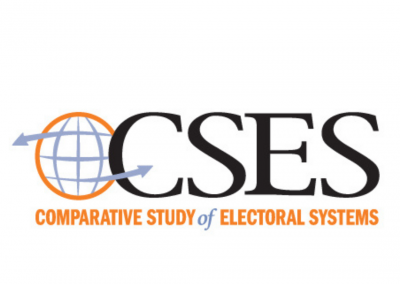
CSES Announcement: Call for Proposals for Module 7 Content
Note: The following announcement was sent to the CSES email list. To receive notices like this one by email, please join our mailing list. July 3, 2023 Dear Comparative Study of Electoral Systems (CSES) User Community, Now is the time to begin our work on...
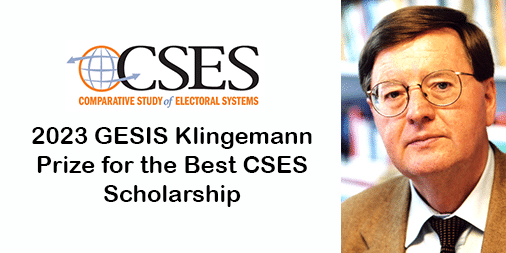
CSES Announcement: Winner of the 2023 GESIS Klingemann Prize for the Best CSES Scholarship
Note: The following announcement was sent to the CSES email list. To receive notices like this one by email, please join our mailing list. May 5, 2023 Dear Comparative Study of Electoral Systems (CSES) user community, We are pleased to award the 2023 GESIS...

CSES Announcement: Nominations are now being accepted for the 2023 GESIS Klingemann Prize for the Best CSES Scholarship
Note: The following announcement was sent to the CSES email list. To receive notices like this one by email, please join our mailing list. The Comparative Study of Electoral Systems (CSES) and the GESIS – Leibniz Institute for the Social Sciences are pleased to...

CSES Announcement: Call for nominations for Module 7 Planning Committee members
Note: The following announcement was sent to the CSES email list. To receive notices like this one by email, please join our mailing list. November 17, 2022 Dear Comparative Study of Electoral Systems (CSES) community, The CSES Module 6 Planning Committee is...
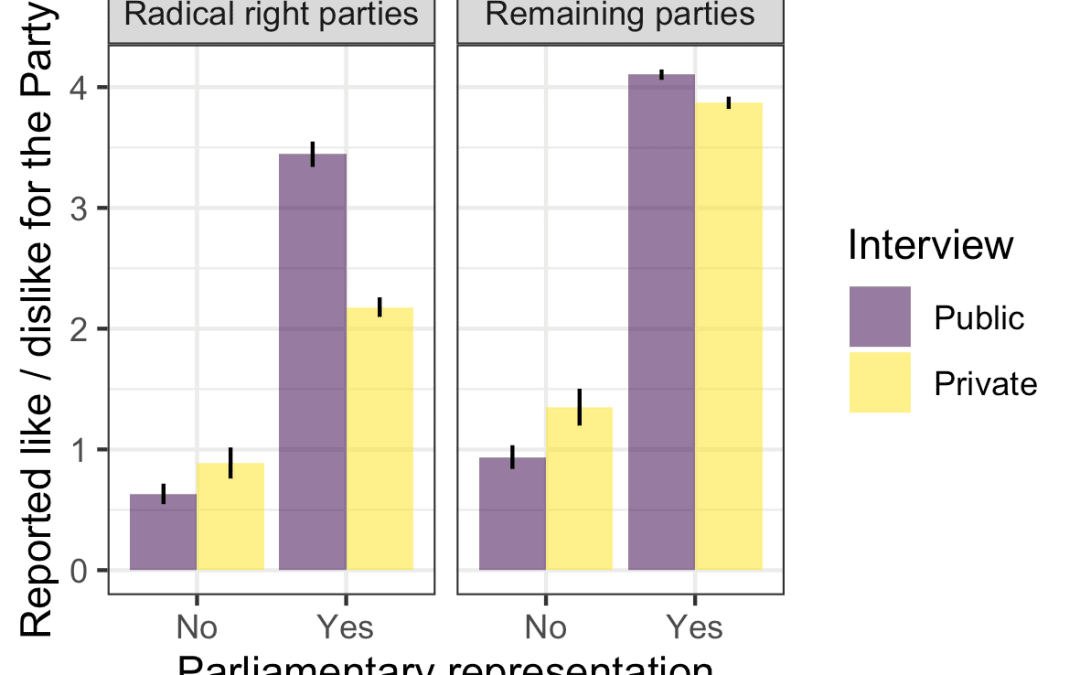
Parliamentary Representation and the Normalization of Radical Right Support
The 2022 GESIS Klingemann Prize for the Best CSES Scholarship was awarded to Vicente Valentim for his article “Parliamentary Representation and the Normalization of Radical Right Support” in Comparative Political Studies. We are grateful that he has provided the...
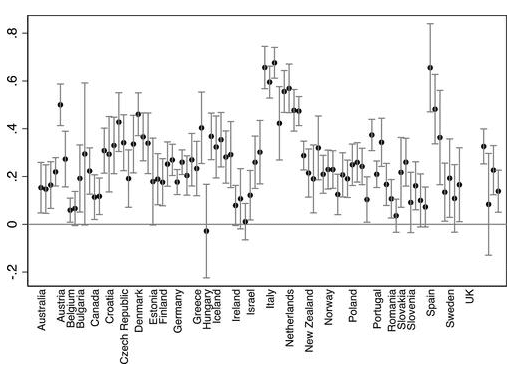
Does the opportunity of policy change shape electoral behavior?
An honorable mention for the 2022 GESIS Klingemann Prize for the Best CSES Scholarship was awarded to Carolina Plescia of the University of Vienna and Francesco Zucchini of the University of Milan for their article "Government alternation and proximity voting: How...
